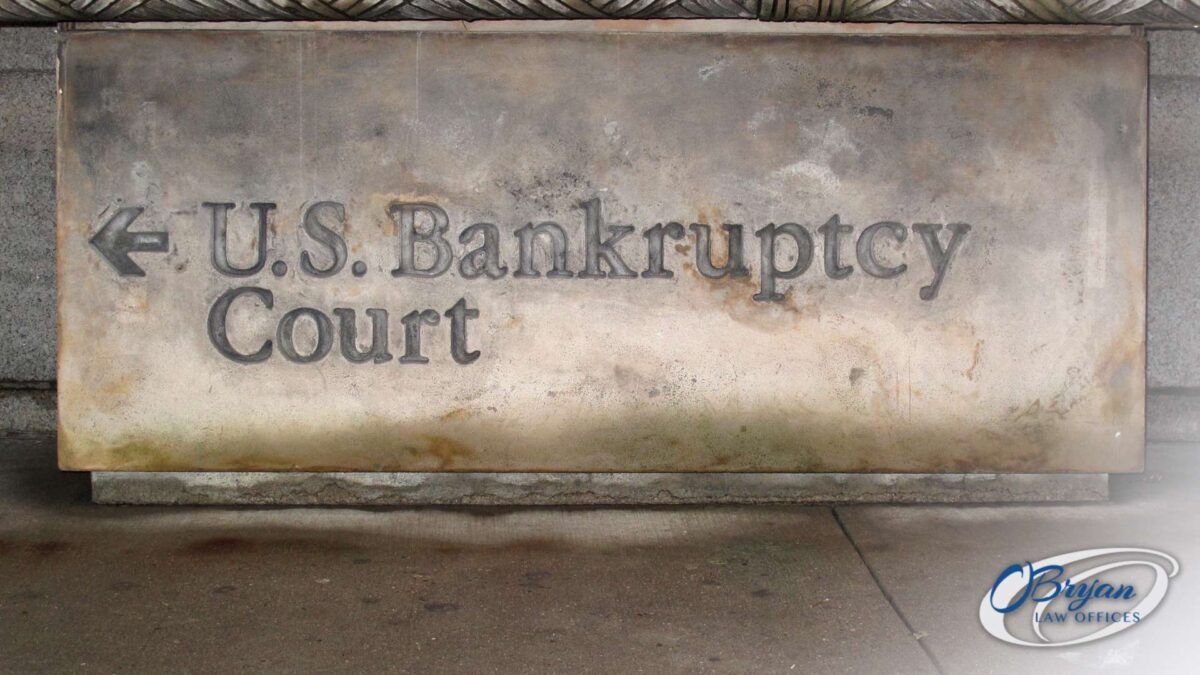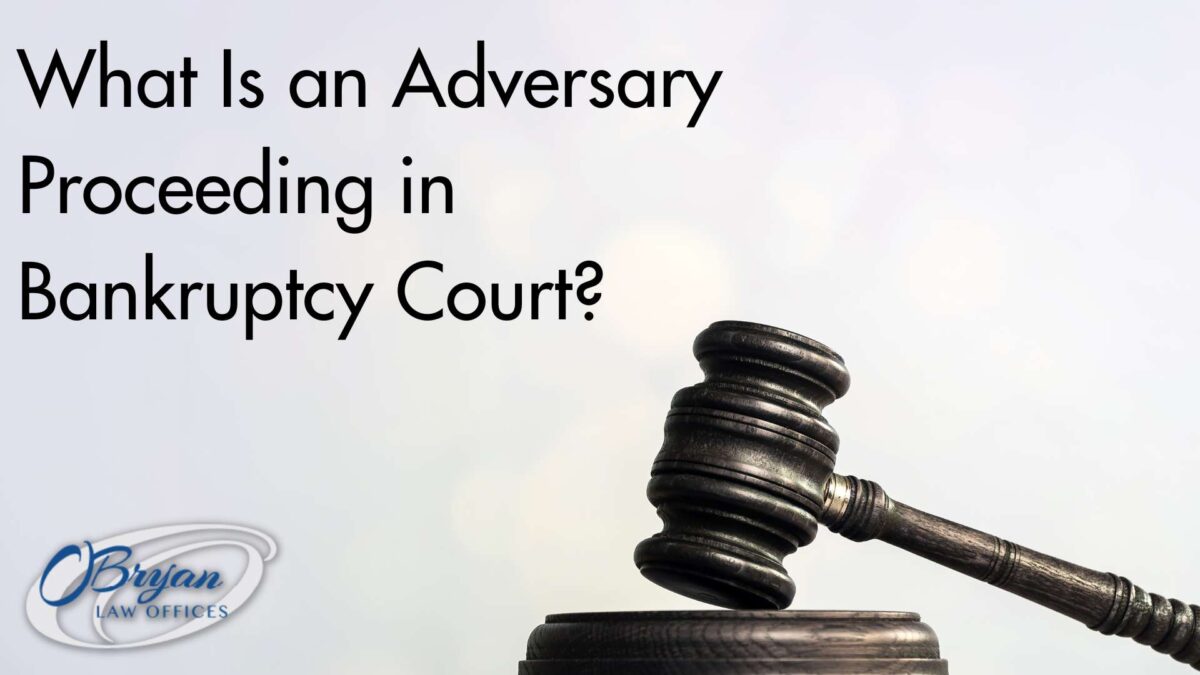An adversary proceeding is a unique type of lawsuit within a bankruptcy case. This bankruptcy litigation occurs when a dispute within a bankruptcy case requires judicial intervention. These proceedings are separate from the bankruptcy case but are related to it, often involving issues like the discharging of debts, allegations of fraud, or the validity of liens.
At O’Bryan Law Offices, our bankruptcy attorneys are adept at navigating the challenges of adversary proceedings, ensuring that our clients’ rights and interests are fiercely represented in the face of such disputes. With our experience in Kentucky bankruptcy law, we are committed to providing clear guidance and robust legal support throughout the course of these challenging proceedings.
If you have questions about your adversary hearing or need assistance filing for bankruptcy, contact the O’Bryan Law Offices at 502-339-0222 to schedule a free consultation with a Kentucky bankruptcy attorney.
What Is an Adversary Proceeding in a Bankruptcy Case?

An adversary proceeding in a bankruptcy case, as defined under the United States Bankruptcy Code, is a specialized form of lawsuit distinct from the broader bankruptcy process. Initiated by filing a complaint with the bankruptcy court, this proceeding operates similarly to a civil lawsuit and adheres to the Federal Rules of Bankruptcy Procedure. Its primary function is to address disputes that arise during a bankruptcy case, which are not resolvable through standard bankruptcy procedures.
Key issues commonly tackled in adversary proceedings include challenges to the debtor’s discharge issued by the United States Trustee or creditors, contests over the validity and extent of liens, claims of fraudulent transfers, and matters concerning the recovery of assets for the bankruptcy estate.
These proceedings play a crucial role in a bankruptcy case, particularly when the integrity of the debtor’s discharge is in question or when there are significant disputes regarding creditors’ rights or estate assets. Essentially, an adversary proceeding serves as a mechanism to ensure that complex legal issues within the framework of a bankruptcy case are resolved fairly, upholding the rights and responsibilities of all involved parties.
Why Might an Adversary Proceeding Happen?
Adversary proceedings in bankruptcy cases are crucial in addressing specific legal disputes that emerge during bankruptcy. These proceedings are akin to a separate lawsuit within the bankruptcy case and are governed by distinct rules. The reasons for an adversary proceeding can vary, but some common triggers include the following reasons.
Alleged Fraud
Alleged fraud, particularly involving debt incurred with deceptive intentions, is a critical issue in bankruptcy cases. These allegations often surface when a creditor or the bankruptcy trustee suspects that the debtor has engaged in fraudulent activities. Such activities can include concealing assets, making false statements in bankruptcy documents, or incurring debt without any intention of repaying it.
In these adversary proceedings, the burden is on the plaintiff to establish the fraudulent conduct of the debtor, which typically requires showing intentional deception or misrepresentation related to the debt incurred. The ramifications of proven bankruptcy fraud are significant, potentially leading to the refusal of discharge for the implicated debts or, in more severe cases, criminal charges.
Alleged Preferential Transfers
Allegations of preferential transfers are another issue that can result in an adversary proceeding. These allegations occur when it is believed that a debtor made payments or transferred assets before filing bankruptcy to certain creditors, showing preference.
Under bankruptcy law, such transfers can be scrutinized within a defined period before the bankruptcy filing (typically 90 days for regular creditors and one year for insiders). This review aims to ensure equal treatment of all creditors and prevent any debtor from favoring certain creditors. If a transfer is deemed preferential, the bankruptcy trustee may seek to recover those assets or payments so they can be redistributed fairly among all creditors.
Owning Property With Someone Else
Owning property with someone else can trigger an adversary proceeding during bankruptcy, especially when determining the division and control of jointly held assets. In such adversary proceedings, the bankruptcy court examines the nature of the joint ownership, whether it is tenancy in common, joint tenancy, or tenancy by the entirety, to decide how the property should be handled.
Disputes often happen when one co-owner files for bankruptcy, potentially affecting the rights and interests of the non-filing co-owner. The bankruptcy court must then assess whether the debtor’s share in the property can be used to satisfy debts to creditors while also considering the legal protections that may apply to the non-filing co-owner.
Running Up Credit Card Balances Before Filing
Running up credit card balances before filing bankruptcy is a serious issue that can result in an adversary proceeding. This occurs when a debtor significantly increases their credit card spending or incurs substantial debt shortly before filing for bankruptcy. Creditors may view this as an attempt to discharge debt never intended to be repaid, leading to allegations of fraudulent intent.
In such cases, creditors or the bankruptcy trustee may challenge the dischargeability of these debts, arguing that they were incurred under false pretenses. The court then examines the expenses’ timing, nature, and purpose to determine if they were legitimate or constituted abuse of the bankruptcy system.
How Long Does Someone Have to Answer a Bankruptcy Proceeding?
A defendant has 30 days to respond after being served with the summons and complaint of the adversary proceeding. This 30-day period is crucial, as it allows the defendant to prepare an appropriate response, whether a formal answer, a motion to dismiss, or other legal pleadings, to address the claims raised against them.
It’s important to adhere to this deadline, as failing to respond within the allotted time can lead to a default judgment, where the bankruptcy court may grant the plaintiff’s requests without further input from the defendant.
What Are the Stages of an Adversary Proceeding According to Federal Rules?

The stages of an adversary proceeding follow a structured sequence that mirrors traditional civil litigation. First, the adversary proceeding commences with the filing of a complaint by the plaintiff, who must then serve the complaint and a summons to the defendant. Following this, the defendant has a specified period, usually 30 days, to file an answer or a motion in response.
If the case proceeds, the discovery stage follows, allowing both parties to exchange information and evidence pertinent to the case. This phase may involve depositions, requests for documents, and interrogatories. After discovery, pre-trial motions, such as motions for summary judgment, may be filed.
If these are not resolved in favor of either party, the case moves to trial, where each side presents its evidence and arguments. The trial concludes with a judgment or verdict. However, it’s important to note that many adversary proceedings are resolved or settled before the trial stage.
Adversary Proceedings vs Contested Matters

Adversary proceedings and contested matters are two distinct types of legal disputes that can arise in the context of a bankruptcy case, each governed by different procedural rules. An adversary proceeding is a formal lawsuit within a bankruptcy case, comparable to a civil trial, and is used for more complex disputes. Governed by the Federal Rules of Bankruptcy Procedure, these proceedings address issues like objections to the debtor’s discharge, allegations of fraud, and disputes over liens or asset ownership. They require filing a complaint, serving it to the involved parties, and following a process similar to regular court cases, including discovery, trial, and potential appeals.
On the other hand, contested matters are less formal and are used for simpler disputes that arise during the bankruptcy process. These might include objections to claims, motions to lift automatic stays, or disputes over the use of cash collateral. Contested matters are typically resolved through motions and hearings in front of a bankruptcy judge without the full procedural hype of an adversary proceeding.
Contact a Kentucky Bankruptcy Lawyer with O’Bryan Law Offices
When navigating the complexities of bankruptcy, having the guidance and support of a trusted legal partner is invaluable. At O’Bryan Law Offices, our team of bankruptcy lawyers is dedicated to helping you achieve a fresh financial start. If you’re facing financial challenges and seeking Kentucky debt relief solutions, we are here to provide counsel and tailored strategies to meet your needs.
Schedule a free consultation with an experienced Kentucky bankruptcy lawyer by calling 502-339-0222.







